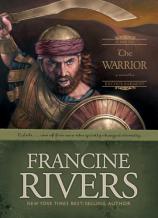The Warrior: A Novella, Sons of Encouragement Series, Book 2
Review
The Warrior: A Novella, Sons of Encouragement Series, Book 2
The Old Testament heroes have often been overly sanitized in Christian circles, but author Francine Rivers reminds us in her gritty novella, THE WARRIOR --- her second installment in the planned five-book "Sons of Encouragement" series --- that the lives of Old Testament men were full of violence, heroism, sexual encounters, and passion for God.
Drawing from the books of Numbers, Joshua, and the beginning of Judges, Rivers takes us through scriptural events through the eyes of Caleb. The story opens as Caleb, or "Kelubai" as he is known, is convinced that the God of the Hebrews who is smiting Egypt and Pharaoh with plagues is the true God. Convincing his family to join forces with the Hebrew slaves, they become part of the exodus to the wilderness. There, they wandered for more than 40 years, waiting for God to deliver them to the promised land.
Through Rivers's vivid imagination, we glean new insights into the person of Caleb. He was not fully Hebrew, descended from the line of Esau, she writes. He was a farmer, a slave, who had been born in a mud hut and lived on one small plot of land. She chronicles Caleb's emancipation and the unfolding of his life as a nomad, traveling great distances and assuming the role of soldier. "Freedom was not the simple matter he had dreamed," writes Rivers. "As a slave, he knew what the day would hold and how to get through it. Now, he didn't know what the next morning would bring."
He was courageous, yet Rivers ably portrays Caleb's conflicting emotions as he pleads with God: "I am as afraid as any man to go into Canaan and walk among the giants who live there. But I fear more not being counted among Your people. Do not allow them to set me aside. Please don't reject me, Lord. Purify my blood. Make me a son of Israel!"
Children's Sunday school flannelgraph stories tend to gloss over a lot of Old Testament scripture, and Rivers bravely tackles some disturbing aspects of Caleb's story. However, even mature Christians will find themselves uneasy --- not with Rivers's depiction of Caleb's life, but with the Biblical violence. In the name of the Lord, thousands of men are killed in battle. Endless gore is spilled. Captured kings are tortured to death. Rivers depicts in one scene how every person and animal in a conquered city is put to the sword, including women, children, and babies. Cities are left in ruins. When lives are spared, young virgin girls are given to men as spoils of war. Caleb, in his eighties, is the recipient of two such young girls.
The Israelites' enemies are not the only ones who meet violent ends. In one chapter, 24,000 Israelites are killed in a plague by God after sinning against him with the Midianite women. In another story, an Israelite sins, and he, his wives, his children, and his livestock are all stoned to death. In yet another scene, God opens the earth and two hundred and fifty Levites are francine struck by fire, then swallowed into a precipice when they rebel. And so on, and so on. As a movie, Caleb's story would be lucky to squeak by with an "R" rating.
Rivers handles the gore and sexual situations with sensitivity, but they will shock the reader nonetheless. However, as C. S. Lewis once admonished Christians, "...we must never avert our eyes from those elements in (our religion) which seem puzzling or repellent, for it will be precisely the puzzling or the repellent which conceals what we do not yet know and need to know."
Rivers is a good storyteller, but the reader may find that, because of the short length of this novella, characters are not as developed as might be desired. Transitions are sometimes missing, and the passion that characterized her series "Lineage of Grace" is notably absent. Perhaps most disappointing is that the brief study section at the end of the novella fails to address the more disturbing questions raised in a reader's mind: Why would God order so much bloodshed? What was the place of women in this Eastern time period? How does Christ's sacrifice in the New Testament change any of this? Readers may discover that this plunge into an Old Testament story is less entertainment than it is theologically challenging.
Reviewed by Cindy Crosby on February 7, 2005





